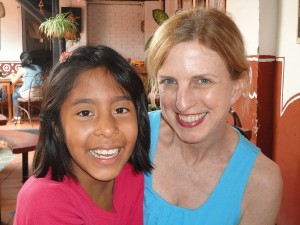Adoption Mosaic founder Astrid Dabbeni, 41, of Portland, Oregon, recently searched for and found her long-lost birth mother, Carmenza Castro, in Bucaramanga, Colombia, reports Katy Muldoon in The Oregonian.
Standing atop a hotel patio last December, Astrid Dabbeni scanned Bucaramanga, Colombia’s, urban panorama. Glossy high rises, red-roofed suburbs and gritty slums spread for miles across the city where she and her sister last saw their birth mother 36 years earlier.
Astrid, 41, co-founder and executive director of the Portland-based nonprofit Adoption Mosaic, had long thought of trying to find her. Yet, shortly before Christmas, as she was poised to begin, the logistical and emotional heft of that search sank in.
She had little to go on. Adoption records from the 1970s were sketchy. Even if she found her files, corruption was rampant in Colombia’s adoption pipeline then; birth certificates and other documents were sometimes fabricated and unreliable. Plus, she didn’t speak Spanish.
How could she possibly find one person, she remembers wondering, in a city of more than 1.2 million?
What if her birth mother was dead, as Astrid’s sister suspected?
If she was alive, what if she didn’t want to be found?
Astrid’s daughter, Maya, 9, wrapped her in a tight hug. Her husband, Paolo, did, too.
Tears welled in her eyes.
The story Astrid discovers is heart-rending:
Carmenza Castro hid her two infant girls inside a duffle bag, hoisted it, ran from her home and hopped a bus leaving Bogotá, Colombia. She’d later tell her daughters, Astrid Dabbeni and Maria DelValle, that she fled fearing for her safety and escaping a desperately troubled marriage.
That day in the early 1970s, the bus rumbled north to Bucaramanga, on a plateau in the Colombian Andes, where Carmenza didn’t know a soul. She and her babies disembarked into a new life that would deliver fear, loss, anguish, hope, happiness and – one day – healing.
Bucaramanga’s nickname is La Ciudad de Los Parques, city of parks, and that’s where the three lived for perhaps as long as a month.
A kind stranger witnessed their routine and took mercy. He gave Carmenza enough money to rent a room, so she and her daughters would have a roof over their heads.
They were warm, dry and safe for a time – and that’s where, as Astrid tells it, the story grows fuzzy.
After months or perhaps a couple of years, Carmenza found a better job in another city. She arranged for her landlady to temporarily watch Astrid and Maria, and she sent money home each week or month to cover their care.
Yet, when Carmenza returned, all her belongings had been thrown away, she was banished from the house and the only things right in her world had vanished.
Her girls were gone.
***
I urge you to read the entire fascinating article, which includes a video link. Part 2 begins here.
Like many other people connected to adoption, I know Astrid through her compelling, popular, and thought-provoking presentations at Latin American Heritage Camp, where she leads workshops and has shared details of her journey. Sending best wishes to Astrid and her family! ~


 ShareThis
ShareThis



 ShareThis
ShareThis